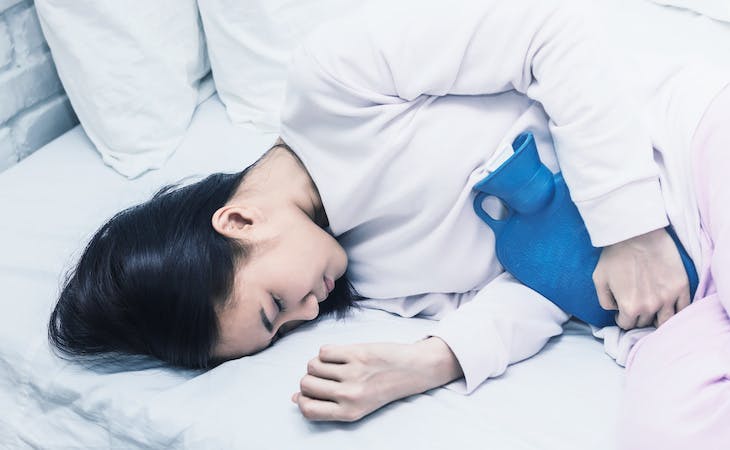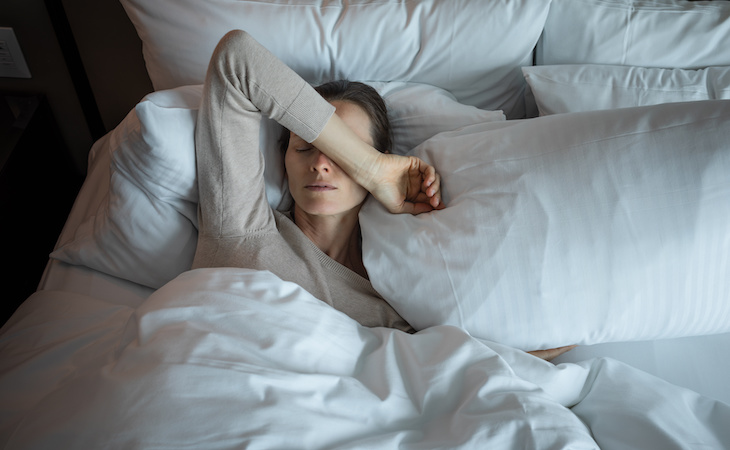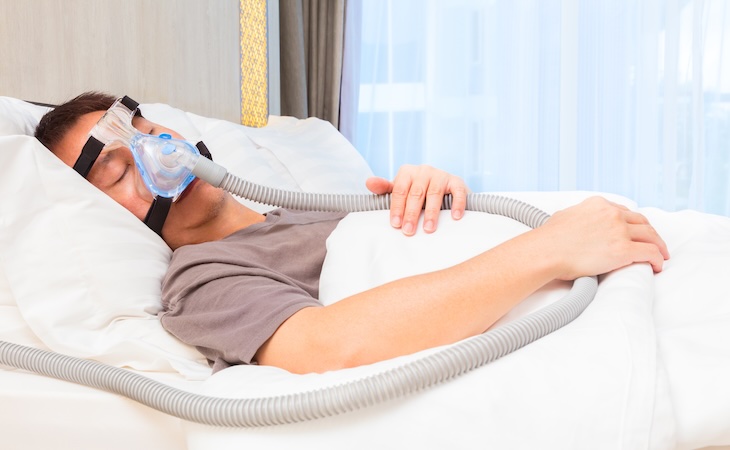Having a urinary tract infection (UTI) isn’t only unpleasant and possibly painful, but it can also really wreck your sleep. The good news is, there are a few strategies you can employ to help ease the nighttime discomfort.
In this article, we explore what a UTI is, explain its symptoms, and provide tips on sleeping better when you have a UTI.
What is a UTI?
A UTI is an infection in any part of your urinary system—your kidneys, ureters (the tubes connecting the kidneys to the bladder), the bladder itself, and the urethra (the tube that empties urine from the bladder to the outside of your body). Most UTIs involve the lower urinary tract—the bladder and the urethra. [6]
Women’s anatomy makes them more prone to developing a UTI than men, but it’s important to point out that both sexes can get them. [6] Although UTIs can affect anyone, certain people are at greater risk of developing them than others.
People who are more likely to get a UTI include:
- Sexually active women [1]
- Men in their 60s and older [2]
- Postmenopausal women [3, 4]
- Uncircumcised toddler and baby boys [5]
- Male and female elders [7]
- People with diabetes [8]
- People with neurological issues [9]
- People who use catheters [10]
What are the most common symptoms of a UTI?
UTIs can sometimes be mistaken for other conditions, but some symptoms are commonly associated with UTIs.
These include:
- A strong, persistent urge to urinate [11]
- A burning sensation when urinating [11]
- Passing frequent, small amounts of urine [11]
- Urine that appears cloudy [12]
- Urine that appears red, bright pink, or cola-colored—a sign of blood in the urine [11, 12]
- Strong-smelling urine [12]
- Pelvic pain, in women—especially in the center of the pelvis and around the area of the pubic bone [11]
How should you sleep with a UTI?
UTI symptoms can make sleeping difficult.
“This is because UTI has discomforting symptoms which may interfere with sleep, including the persistent urge to urinate, pelvic discomfort, and frequent urination,” says Virginia Blackwell, MD, with dofeve.org.
Although UTIs can interfere with your sleep, there are a variety of methods you can use to alleviate UTI pain and discomfort at night.
Tips for sleeping better with a UTI include:
1. Drink plenty of water during the day—and reduce your caffeine intake
Staying well hydrated will help to flush out the bacteria causing the infection. Limiting your caffeine will reduce the urge to urinate and the frequency of needing to “go.” [13, 14] (Drinking enough water can also help you sleep better with hemorrhoids. Here are more ways to improve your sleep with hemorrhoids.)
2. Limit your fluid intake in the evening
Drinking liquids in the evening, especially close to bedtime, can make you need to urinate during the night. Restrict your fluid intake to earlier in the evening. [15]
3. Avoid foods and drinks that irritate your bladder
This includes caffeine, alcohol, carbonated drinks, chocolate, acidic fruits and juices (such as citrus juice), spicy foods, and tomatoes or products containing tomatoes. [16]
4. Schedule nighttime bathroom breaks
UTIs can cause a lot of frequent urination and urinary retention at nighttime. These may be alleviated by emptying your bladder before bed and scheduled nighttime bathroom breaks. [18]
5. Wear an incontinence pad or pants
If your UTI causes your bladder to leak at night, wearing these special undergarments will keep you from waking up to a wet bed. “This can ease the concern of urinating in your sleep,” says Blackwell. (Here’s how to get urine stains out of a mattress if you do have an accident.)
6. Sleep with a heating pad
Hold a heating pad or hot water bottle (wrapped in a towel) against your abdomen to minimize bladder discomfort or pressure. [17]
7. Take pain relievers as needed
Consider taking a pain reliever such as phenazopyridine, which is available over-the-counter in several analgesics specifically for relief of the pain, burning, and urgency of UTIs. [19]
FAQs
Do UTI symptoms get worse at night?
UTI symptoms could potentially be worse at night. Women experience worsened UTI symptoms during sleep/at night because urine output is at its lowest, explains Blackwell.
When should you see your doctor for a UTI?
If you still experience UTI symptoms despite your efforts to treat them, it’s time to see your doctor. Also, if recurring infections are an issue, talk with your doctor and see if they’ll prescribe an antibiotic to take each time you get one.
See a doctor if UTI symptoms do not clear up on their own within five days or if you experience fevers and nausea, says Blackwell. Your doctor can also prescribe a medication to treat an overactive bladder and prevent nighttime incontinence while your UTI heals with antibiotics.
Your risk for UTIs goes as up as you get older. Here are more age-related issues that can impact sleep and how to deal with them.
References
- Moore EE, Hawes SE, Scholes D, Boyko EJ, Hughes JP, Fihn SD. Sexual intercourse and risk of symptomatic urinary tract infection in post-menopausal women. J Gen Intern Med. 2008;23(5):595-599. doi:10.1007/s11606-008-0535-y
- Schaeffer AJ, Nicolle LE. CLINICAL PRACTICE. Urinary Tract Infections in Older Men. N Engl J Med. 2016;374(6):562-571. doi:10.1056/NEJMcp1503950
- Suskind AM, Saigal CS, Hanley JM, et al. Incidence and Management of Uncomplicated Recurrent Urinary Tract Infections in a National Sample of Women in the United States. Urology. 2016;90:50-55. doi:10.1016/j.urology.2015.11.051
- Ferrante KL, Wasenda EJ, Jung CE, Adams-Piper ER, Lukacz ES. Vaginal Estrogen for the Prevention of Recurrent Urinary Tract Infection in Postmenopausal Women: A Randomized Clinical Trial. Female Pelvic Med Reconstr Surg. 2021;27(2):112-117. doi:10.1097/SPV.0000000000000749
- Morris BJ, Wiswell TE. Circumcision and lifetime risk of urinary tract infection: a systematic review and meta-analysis. J Urol. 2013;189(6):2118-2124. doi:10.1016/j.juro.2012.11.114
- Flores-Mireles AL, Walker JN, Caparon M, Hultgren SJ. Urinary tract infections: epidemiology, mechanisms of infection and treatment options. Nat Rev Microbiol. 2015;13(5):269-284. doi:10.1038/nrmicro3432
- Rowe TA, Juthani-Mehta M. Urinary tract infection in older adults. Aging health. 2013;9(5):10.2217/ahe.13.38. doi:10.2217/ahe.13.38
- de Lastours V, Foxman B. Urinary tract infection in diabetes: epidemiologic considerations. Curr Infect Dis Rep. 2014;16(1):389. doi:10.1007/s11908-013-0389-2
- Storme O, Tirán Saucedo J, Garcia-Mora A, Dehesa-Dávila M, Naber KG. Risk factors and predisposing conditions for urinary tract infection. Ther Adv Urol. 2019;11:1756287218814382. Published 2019 May 2. doi:10.1177/1756287218814382
- Anggi A, Wijaya DW, Ramayani OR. Risk Factors for Catheter-Associated Urinary Tract Infection and Uropathogen Bacterial Profile in the Intensive Care Unit in Hospitals in Medan, Indonesia. Open Access Maced J Med Sci. 2019;7(20):3488-3492. Published 2019 Oct 14. doi:10.3889/oamjms.2019.684
- CDC. Urinary Tract Infection. https://www.cdc.gov/antibiotic-use/uti.html
- National Library of Medicine. Urinary Tract Infection. https://www.ncbi.nlm.nih.gov/books/NBK470195/
- Le Berre M, Presse N, Morin M, et al. What do we really know about the role of caffeine on urinary tract symptoms? A scoping review on caffeine consumption and lower urinary tract symptoms in adults. Neurourol Urodyn. 2020;39(5):1217-1233. doi:10.1002/nau.24344
- Tian Y, Cai X, Wazir R, Wang K, Li H. Water consumption and urinary tract infections: an in vitro study. Int Urol Nephrol. 2016;48(6):949-954. doi:10.1007/s11255-016-1262-7
- Nguyen LN, Randhawa H, Nadeau G, et al. Canadian Urological Association best practice report: Diagnosis and management of nocturia. Can Urol Assoc J. 2022;16(7):E336-E349. doi:10.5489/cuaj.7970
- National Library of Medicine. Recurrent Urinary Tract Infections. https://www.ncbi.nlm.nih.gov/books/NBK557479/
- National Institutes of Diabetes and Digestive and Kidney Diseases. Treatment for Bladder Infection in Adults. https://www.niddk.nih.gov/health-information/urologic-diseases/bladder-infection-uti-in-adults/treatment
- National Institutes of Diabetes and Digestive and Kidney Diseases. Treatment of Urinary Retention.https://www.niddk.nih.gov/health-information/urologic-diseases/urinary-retention/treatment
- National Library of Medicine. Phenazopyridine. https://www.ncbi.nlm.nih.gov/books/NBK580545/




